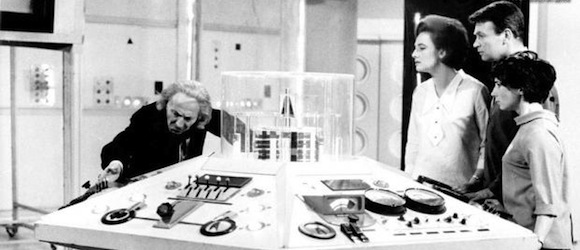How “An East Indian Teamed Up With a Canadian and a Young Woman to Revolutionize” The BBC and Make Doctor Who
The World Doesn't End Because the Doctor Dances

io9 has an incredibly fascinating article on the team that put together the very first Doctor Who series nearly fifty years ago, namely director Waris Hussein, series “originator” Sydney Newman, and producer Verity Lambert, all newcomers to the BBC and establishment outsiders in a production studio what was predominantly older British men. As an East Indian man, a Canadian immigrant, and a young woman, the three show runners were considered totally at odds with the prevailing culture of the BBC at the time, and so was their commitment to science fiction. According to Hussein, it was pretty much assumed that they’d fall on their faces.
Hussein talked a lot on the panel [at Who convention Gallifrey One last weekend] about the ways the BBC tried to starve the show of resources — he wanted to do all sorts of ambitious tracking shots, but he was stuck with cameras bigger than the people operating them. All of the camera operators wound up with sore backs at the end of the shoot. And they were trapped in Studio D at Lime Grove, an ancient studio that was the size of a shoebox, where they were trying to accomplish ambitious shots like having people run into a phone booth and emerge inside a giant control room.
As another way of making sure nothing too crazy was going on, the show was saddled with an executive producer from the BBC old guard, who saw his role as one of explaining how to make a television show in the first place, despite not having much invested in Who‘s actual concepts. On top of that, William Hartnell, the actor behind the first Doctor, had very much the sensibilities of an old fashioned Englishman of an era somewhat earlier than Hussein, Newman, and Lambert would have preferred.
But over time, said Hussein, Hartnell and he developed a tremendous mutual respect, and they all became a great team. “He transformed through the period of time we knew each other,” as Hussein puts it. “And it ended up with mutual respect. Now, that’s progression. And I think that’s an important progression. All his prejudices fell away.” Hussein always felt like the thing to do with prejudice, in these situations was “not to fight it, but to teach them. I didn’t teach him anything explicitly, it was implicit.”
As for Lambert, women producers did not exist at the BBC at the time… outside of the Children’s Department. The ladies there were generally in their fifties and sixties, and according to Hussein, not a few of them took it upon themselves to assume that the younger Lambert had slept her way into a job at the Serials Department.
If you’re any kind of Who fan, but especially if you’re one like me, who’s only joined the fandom since the 2005 reboot, you should read io9’s article in its entire, including the show’s struggles to craft a first episode that really resonated with viewers.
Have a tip we should know? tips@themarysue.com